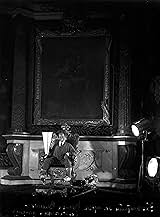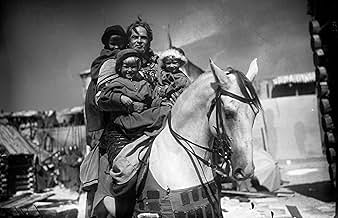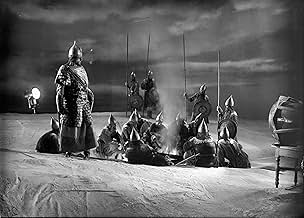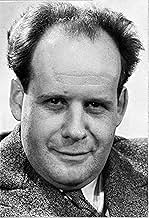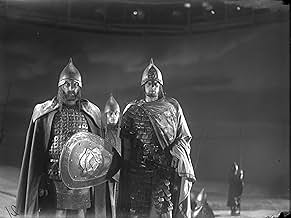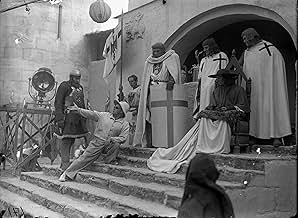CALIFICACIÓN DE IMDb
7.5/10
13 k
TU CALIFICACIÓN
La historia de cómo un gran príncipe ruso dirigió un ejército para luchar contra una fuerza invasora de Caballeros Teutónicos.La historia de cómo un gran príncipe ruso dirigió un ejército para luchar contra una fuerza invasora de Caballeros Teutónicos.La historia de cómo un gran príncipe ruso dirigió un ejército para luchar contra una fuerza invasora de Caballeros Teutónicos.
- Dirección
- Guionistas
- Elenco
- Premios
- 2 premios ganados en total
Nikolay Cherkasov
- Aleksandr Nevsky
- (as N. Cherkasov)
Nikolai Okhlopkov
- Vasili Buslai
- (as N. Okhlopkov)
Andrei Abrikosov
- Gavrilo Oleksich
- (as A. Abrikosov)
Dmitriy Orlov
- Ignat - the Master Armorer
- (as D. Orlov)
Vasili Novikov
- Pavsha - Governor of Pskov
- (as V. Novikov)
Nikolai Arsky
- Domash Tverdislavich - a Novgorod Boyar
- (as N. Arsky)
Varvara Massalitinova
- Amelfa Timoferevna - Buslai's Mother
- (as V. Massalitova)
Valentina Ivashova
- Olga Danilovna - a Maid of Novgorod
- (as V. Ivashova)
Aleksandra Danilova
- Vasilisa - a Maid of Pskov
- (as A. Danilova)
Sergei Blinnikov
- Tverdilo - Traitorous Mayor of Pskov
- (as S. Blinnikov)
Ivan Lagutin
- Anani - a Monk
- (as I. Lagutin)
Lev Fenin
- The Archbishop
- (as L. Fenin)
Naum Rogozhin
- The Black-Hooded Monk
- (as N. Rogozhin)
Nikolai Aparin
- Mikhalka
- (sin créditos)
Boris Belyakov
- Rytsar
- (sin créditos)
A. Gulkovski
- Teutonic Knight
- (sin créditos)
Avenir Gulkovskiy
- rytsar Tevtonskogo ordena
- (sin créditos)
- Dirección
- Guionistas
- Todo el elenco y el equipo
- Producción, taquilla y más en IMDbPro
Opiniones destacadas
I think it's a superb cinematography experience, once again Einsenstein goes beyond the conventional visual elements of the movies, lets take an example, we are used to see the white color as a sign of purity, and the black color as the "bad" element. Here this visual elements are twisted, showing the enemy in white and the russians in dark uniforms. Certainly there is a propaganda tone in the whole story, but it's quite comprehensible for the time (previous to WWII) and the country. There is another element for which this movie is so touching, the excellent music by Serge Prokofiev, and specially the part of the battle. Alexander Nevsky is very much worth seeing not seeking for a conventional war movie, but as an alternative way of cinematic expression.
In 1242, Russia in being invaded by two sides: from the orient by the Mongols and from Europe side, by the Germans Teutonic Knights of the Holy Roman Empire. The city of Novgorod is the last free city in Russia. The population, in order to organize the defense of Novgorod and the lands of Russia, calls the Prince Aleksandr Nevsky, who had defeated the Swedish in a previous battle. His successful strategy defeats the Germans, after a great battle on a frozen lake. This movie was made in 1938 due to the threaten of the German to Russia, in a pre-Second World War period. The idea was to make propaganda pro-Russia. However, it is an overwhelming, marvelous, stunning powerful masterpiece. It is amazing the combat scene on the frozen lake. The present generation is very accustomed to special effects, like in the `Lord of the Rings' trilogy, and maybe cannot understand how fantastic is this black and white fight. If the viewer can forget the ideology and watch it as an art, he will certainly be astonished in the end with such a masterpiece. My vote is ten.
Title (Brazil): Alexander Nevsky
Title (Brazil): Alexander Nevsky
Sergei Eisenstein's "Alexander Nevsky" is a biopic of the famous prince, but when released it was seen as an expression of the growing suspicion of Nazi Germany. Indeed, the battle scenes make the Teutonic Knights - aka the Germans - get depicted as faceless goons who have no qualms about killing anyone. The epic battle scene is probably the most well remembered scene in the movie. It basically says "If you invade Russia, expect the same fate as befell the Teutonic Knights." Hitler didn't heed the warning, and his hoped-for thousand-year Reich only lasted twelve years (the harsh winters didn't help matters).
Understanding that it's a form of propaganda, it's an impressive movie. I wouldn't expect otherwise from Eisenstein. If you're going to teach a course on Russian cinema, you would have to include this one. Excellent movie.
Understanding that it's a form of propaganda, it's an impressive movie. I wouldn't expect otherwise from Eisenstein. If you're going to teach a course on Russian cinema, you would have to include this one. Excellent movie.
Like many of Eisenstein's other works, "Aleksandr Nevsky" is a beautifully made and well-written propaganda piece. Even today, it stands on its own with a solid story and incredible action scenes. No one did an epic battle better than Eisenstein ("October" and "Ivan the Terrible"), and the giant battle on the frozen lake in "Nevsky" ranks up there as one of his best.
Just as important to the film as Eisenstein's script and visuals is the masterful score by Prokofiev. Fortunately, it has been rerecorded for the most recent video release and the new soundtrack adds incalcuable depth and power to the story on the screen. In my opinion, the film's score is simply the best ever composed for a film. It fits the film perfectly, both during the film's intense action scenes and the lingering moments of reflection. If for no other reason, one should see this film to hear one of the 20th century's greatest composer's best works.
The story is true (well, as true as events from the 1200s can be accurately recreated) and simple, but powerful. Despite its heavy-handed Russian/Soviet patriotism, the film succeeds in telling a compelling story. When one looks at the events unfolding when the film was made, it becomes even more of a masterpiece.
No, "Nevsky" doesn't have the flashy visuals or super-handsome stars of a modern war epic, but it still ranks of one of the most interesting films in my book. For fans of Eisenstein or classic cinema, it is an absolute must-see. And for people who want to see the Soviet propaganda machine firing on all cylinders, check it out as well.
Just as important to the film as Eisenstein's script and visuals is the masterful score by Prokofiev. Fortunately, it has been rerecorded for the most recent video release and the new soundtrack adds incalcuable depth and power to the story on the screen. In my opinion, the film's score is simply the best ever composed for a film. It fits the film perfectly, both during the film's intense action scenes and the lingering moments of reflection. If for no other reason, one should see this film to hear one of the 20th century's greatest composer's best works.
The story is true (well, as true as events from the 1200s can be accurately recreated) and simple, but powerful. Despite its heavy-handed Russian/Soviet patriotism, the film succeeds in telling a compelling story. When one looks at the events unfolding when the film was made, it becomes even more of a masterpiece.
No, "Nevsky" doesn't have the flashy visuals or super-handsome stars of a modern war epic, but it still ranks of one of the most interesting films in my book. For fans of Eisenstein or classic cinema, it is an absolute must-see. And for people who want to see the Soviet propaganda machine firing on all cylinders, check it out as well.
Eisenstein's "Alexander Nevsky" was made mostly for propaganda purposes in 1938. It was a reminder to all Russians of their dastardly neighbors (the Nazis) to their west. The film plays on this comparison and several others to a lesser degree. The evil Germanic Teutonic Knights just happen to be of the Christian faith and their religious leaders make for very effective villians. Although Nikolai Cherkasov as Nevsky and Nikolai Okhlopkov as his right-hand man, Vasili, are commanding in their roles, this movie is mainly noted for the final climactic battle between good (the Russians) and pure evil (the Germans). Eisenstein purposely covers the Germans with over-sized helmets so that they're totally devoid of any human facial expressions. On the contrary, the Russian peasants who comprise most of Nevsky's army are portrayed with a variety of emotions and their humanity is not only recognizable but refreshing and appealing to the viewer. When the Teutonic Knights make their charge on the Russian position, the action is fast and furious and it would be difficult to find any other film which stages its action scenes as well as Eisenstein does here. Although a bit dated in the print that I saw (the sound was certainly a bit off) this movie is a must-see for anyone interested in foreign films and especially the Russian cinema during the days of Stalin. The Germans might have thought twice about attacking Russia in 1941 if they had seen this film beforehand. The message was clear back then. In the words of Alexander Nevsky himself: "Do not enter Russia with a sword in your hand." Well, you can't say they weren't warned.
¿Sabías que…?
- TriviaJoseph Stalin wanted this film to be a propaganda tool to warn Soviet citizens to be wary of German aggression. However, it was rejected at first due to it being "too anti-German", as it came out shortly before the Soviet-German non-aggression pact of 1939 was signed. In 1941, the peace was broken and Stalin reportedly demanded that it be shown in every Soviet movie theater as a rallying cry against the invasion.
- ErroresGavrila Alexich, one of the movie's main protagonists, could not participate in the Battle of Ice. He was killed one year before it, in 1241, storming the fortress of Koporye.
- Citas
Alexandr Nevsky: Go tell all in foreign lands that Russia lives! Those who come to us in peace will be welcome as a guest. But those who come to us sword in hand will die by the sword! On that Russia stands and forever will we stand!
- Créditos curiososBefore the word "End" appears Alexandr Nevsky's famous quote "But those who come to us sword in hand will die by the sword! On that Russia stands and forever will we stand!" appears on the screen, right after Nevsky said it in the movie.
- Versiones alternativasA new edition appeared on video in 1995 with the entire Prokofiev score newly recorded in hi-fi stereo, using the same 1938 orchestrations and perfectly synchronized to the original 1938 dialogue and sound effects tracks, so that it is now possible to see and hear the film exactly as it always was, with the exception being that the music is now heard in hi-fi sound, rather than the tinny 1938 recording.
- ConexionesEdited into Hechiceros (1977)
Selecciones populares
Inicia sesión para calificar y agrega a la lista de videos para obtener recomendaciones personalizadas
- How long is Alexander Nevsky?Con tecnología de Alexa
Detalles
Taquilla
- Total a nivel mundial
- USD 2,226
- Tiempo de ejecución1 hora 52 minutos
- Color
- Mezcla de sonido
- Relación de aspecto
- 1.37 : 1
Contribuir a esta página
Sugiere una edición o agrega el contenido que falta

Principales brechas de datos
By what name was Aléxander Nevsky (1938) officially released in India in English?
Responda
